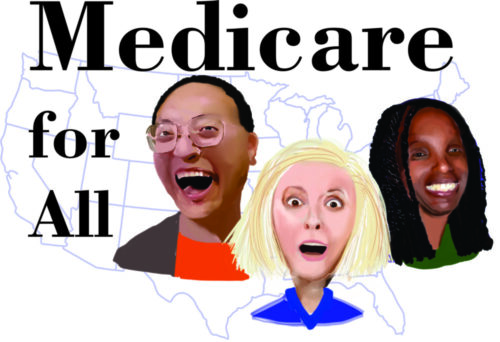Medicare For All Would Increase Government Wages
By Ellen Yoshigitsu
egiese@mail.ccsf.edu
Our city and the unions that represent the city employees should care about universal guaranteed health care (often known as Medicare for All or single payer healthcare) a lot more than they do.
Why? Because a lot of money that the City spends now on health care (HC) could go instead to higher wages for city employees and better services for all of us.
San Francisco and its agencies such as Muni or the school district, pay for employee health care in three ways.
First, they pay directly for HC for people currently working, and second, for HC for retired workers, but also, bizarrely, in a third pricey but little known way, by having to set aside large amounts of money into trust funds to cover retiree HC in case the city were to become insolvent sometime in the future. These large emergency pots of money are held in various places. For example, for firefighters, Muni drivers, City college and other City employees the funds are held in the San Francisco Retiree Health Care Trust Fund while the funds for school district employees are held in the California Employers’ Retiree Benefit Trust Fund.
Last winter SFUSD was ordered by the state to fix its structural deficit. People were asking, “Where’s the Covid relief money?”, referring to the CARES Act and the ARP Act. Under threat of a state takeover, the School Board approved a three-year plan, requiring each school site to reduce its budget by 10% each of the three years. At the small elementary school where my daughter teaches that could mean losing a teacher a year. Devastating. Fortunately, for the school year that began this week, the school has managed to mitigate the worst of the cuts.
But in scrutinizing the district’s expenditures last fall, I noticed $40 million set aside in 2020-21 and 60 million in 2021-22.
At a budget forum last fall, Meghan Wallace, the district’s Head of Finance, confirmed this. She sadly noted that yes, they would continue to pursue increased revenue, but that costs (HC is a big part of this) would likely rise faster than any revenue increase, so these cuts would likely continue into the future even beyond the three-year plan. This is really bad news for struggling schools.

But don’t seniors get their health care through Medicare already? Yes, but the basic coverage needs to be supplemented. It does not include vision, hearing or dental, and has a 20% out of pocket clause that will eat whatever retirement savings a person has. Do you want to be toothless and broke in your retirement, assuming you can retire at all? Look around, there are quite a few toothless and broke seniors living on our streets right now.
In the US we have an employer-based health care system. Most of us above the poverty line get our health care through our jobs if we get it at all. City agencies are among the major employers in SF, so providing health care for their employees is a large part of the city budget. This responsibility to provide HC is a huge financial burden on the city.
Under a Medicare for All or single payer system, costs would be considerably lower, for both employers and employees. A study prepared for Gov Newsom’s Healthy California for All Commission last year by the UC Berkeley Labor Center found that even without ‘cost sharing’ and including long term care for elders and the disabled a single payer system would save California billions of dollars annually. It does this by simplifying administration costs, negotiating for lower drug prices, and eliminating profit taking by private insurance companies.
So how is a single payer system paid for? Through taxes and cost savings. A good example of a proposed tax structure is ACA 11, a constitutional amendment brought forward in January 2022 to pay for AB1400, the California Nurses Association’s universal guaranteed HC bill, known as CalCare. ACA11 proposes a suite of taxes, including excise, payroll, employer, and income, from which small businesses and low-income people would be exempted.
New taxes? Isn’t this going to hurt our budgets? No, because there would be no premiums, no co-pays, no out of pocket expenses. Check out this calculator to see how much you could save.
Employers who now provide HC to their employees and retirees would see enormous savings. Beyond the taxes they would have no responsibility to pay for current employee HC, nor for HC for retirees, nor to fund those crazy HC trust funds in case of fiscal disaster! Simple.
The ‘structural deficit’ plaguing the school district and City College would be greatly reduced. The ever-tightening fiscal vise would be alleviated, and city agencies would be able to spend their budgets on services. How about staff to run restorative justice circles? Money for field trips? Smaller class sizes? Decent pay for substitute teachers?
And the hundreds of millions of dollars sitting in those retiree HC trust funds could be repurposed to do all kinds of things. Imagine the good it can do. The reimbursement of the employers and employees who have funded them.
So where does the City or the City’s unions stand on the issue of Medicare for All? Good question. They may have passed resolutions in support of it, but have done little else, to my knowledge.
